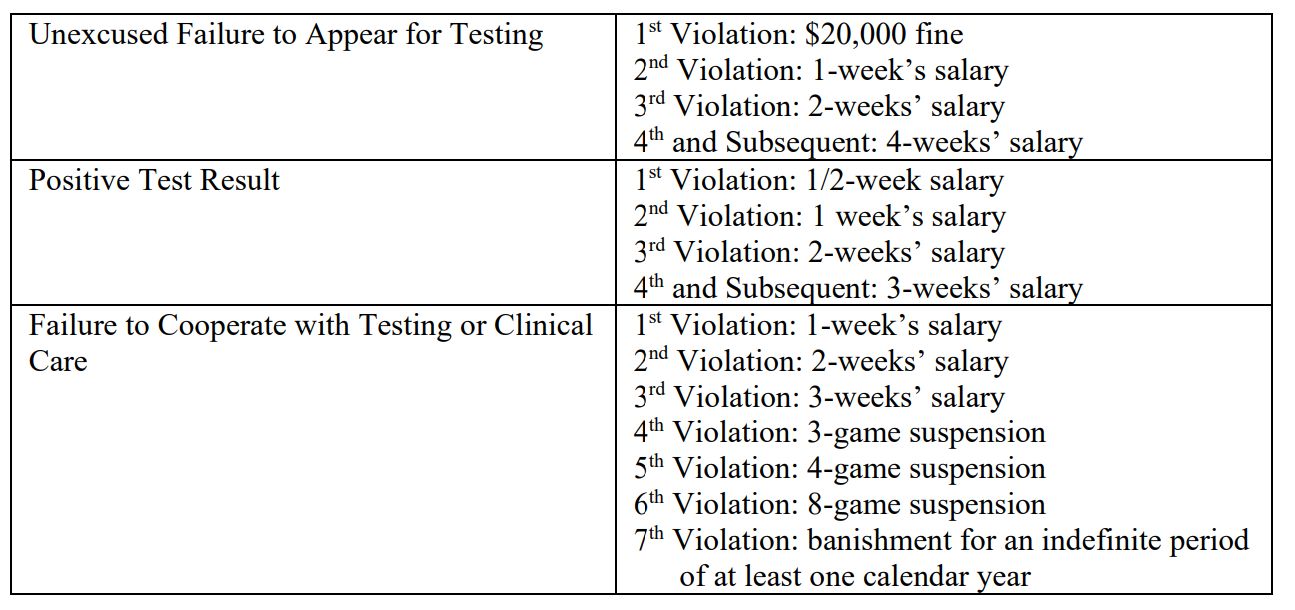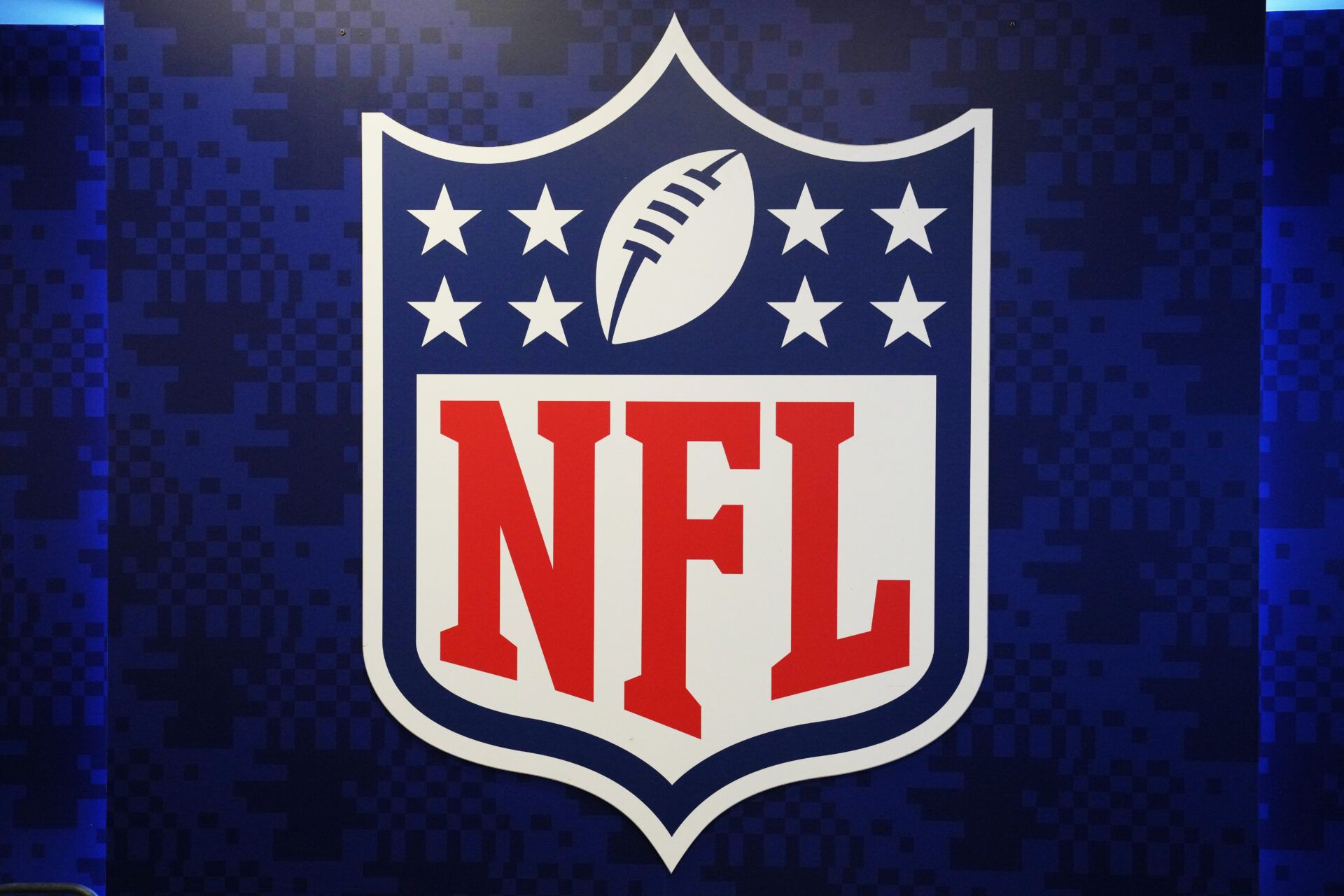Every season, a handful of NFL players are suspended. Whether it’s for something that occurred on the field or off of it, Commissioner Roger Goodell and the league office can issue suspensions for a variety of violations.
Let’s break down everything you need to know about NFL suspensions, including the various violations that can lead to them, the league’s personal conduct policy, whether players can be banned from the NFL, and more.

What Can NFL Players Get Suspended For?
The commissioner can hand down suspensions for “conduct detrimental to the league,” which includes things like fights, dirty hits, and gang signs.
For example, Houston Texans linebacker Azeez Al-Shaair was suspended three games for his dirty hit to the head of Jacksonville Jaguars quarterback Trevor Lawrence in Week 13 of the NFL season.
NFL VP of Football Operations Jon Runyan stressed that Al-Shaair’s “multiple offenses for personal fouls and sportsmanship-related rules violations” contributed to the suspension length.
Players who are in the NFL’s Drug Intervention Program are subject to suspensions if they fail to cooperate with drug testing or clinical care. In the past, players could receive suspensions for failed drug tests, but that is no longer the case. Once a player is in stage two of the program, the NFL’s substance abuse policy lists the following punishments:

If a player breaks the law by using, possessing, buying, selling, or distributing drugs (or even conspiring to do so), they are also subject to suspension. A first-time offender will be suspended without pay for four regular-season or postseason games. For a second or subsequent offense, the player will be suspended without pay for a minimum of six games and a maximum of 10.
Alcohol is also included in the NFL’s substance abuse policy. If a player breaks the law and alcohol is involved, he is suspended without pay for three games (regular season or postseason). For a second or subsequent offense, the player will be suspended without pay for eight games.
The commissioner can impose harsher discipline if there are “aggravating circumstances” such as extreme intoxication (BAC of .15% or more), property damage, serious injury, or death.
The NFL’s performance-enhancing drug policy states that a player will be suspended without pay if they test positive for PEDs or attempt to manipulate a test result or specimen. For a stimulant, diuretic, or masking agent, a first-time offender is suspended for two games. For an anabolic agent, it’s a six-game suspension.
If a player tests positive for a prohibited PED and attempts to manipulate the test result or specimen, it’s an eight-game suspension. A second offense results in a 17-game suspension, and after a third violation, the player is “banished from the NFL for a period of at least two seasons.”
If a player breaks the law (or conspires to do so) in relation to steroids, growth hormones, stimulants, or related substances, they will be suspended or have their contract terminated. First offenders are suspended without pay for up to six games, and repeat offenders are suspended even longer.
The NFL can also suspend players for varying lengths for gambling. For example, Calvin Ridley was suspended for the 2022 season after he bet on NFL games, while Jameson Williams received a four-game suspension for betting on other sports while at the Detroit Lions’ facility.
If the NFL commissioner determines that a team committed an “extraordinarily unfair act,” the league has the power to fine the team or individual, remove draft picks, suspend the individuals involved, and even reverse the result of the game or reschedule the game “either from the beginning or from the point at which the extraordinary act occurred.”
This has never occurred, but it’s very interesting that it’s included in the NFL rulebook.
The commissioner can even suspend players for one game (regular season or postseason) if they don’t “present a professional and appropriate appearance while before the public on game day.” The NFL rulebook specifically mentions prohibited activities such as the “use of tobacco products (smokeless included) while in the bench area and use of facial makeup.”
Once a player is suspended, they have five business days to appeal the NFL’s decision. An arbitrator hears from both sides at an appeal hearing and then determines whether to uphold the suspension.
Also, if a player is arrested or gets in any legal trouble, the NFL can suspend them based on the league’s personal conduct policy.
What Is the NFL’s Personal Conduct Policy?
The NFL’s personal conduct policy is a lengthy document that spells out how all employees must carry themselves, including “owners, coaches, players, other team employees, game officials, and employees of the league office, NFL Films, NFL Network, or any other NFL business.”
The personal conduct policy opens with the following statement: “It is a privilege to be part of the National Football League. Everyone who is part of the league must refrain from conduct detrimental to the integrity of and public confidence in the NFL.
“Conduct by anyone in the league that is illegal, violent, dangerous, or irresponsible puts innocent victims at risk, damages the reputation of others in the game, and undercuts public respect and support for the NFL.
“We must endeavor at all times to be people of high character; we must show respect for others inside and outside our workplace; and we must conduct ourselves in ways that favorably reflect on ourselves, our teams, the communities we represent, and the NFL.
“To this end, the league provides annual and ongoing education regarding the Policy and related topics such as respect and appropriate behavior, as well as resources for all employees to assist them in conforming their behavior to the standards expected of them. Our goal is to prevent violations, but when violations of this Policy do occur, appropriate disciplinary action must follow.”
The NFL’s personal conduct policy states that simply because charges are not filed against an NFL employee doesn’t mean they are exempt from discipline:
“It is not enough simply to avoid being found guilty of a crime in a court of law. We are all held to a higher standard and must conduct ourselves in a way that is responsible, promotes the values of the NFL, and is lawful.
“Players convicted of a crime or subject to a disposition of a criminal proceeding (as defined in this Policy) are subject to discipline. But even if the conduct does not result in a criminal conviction, players found to have engaged in any of the following conduct will be subject to discipline.”
The NFL recently suspended Buffalo Bills linebacker Von Miller for four games for violating their personal conduct policy.
Do Suspended Players Take Up a Roster Spot, and Can They Attend Practice or Games?
When a player is suspended, they are placed on the reserve/suspended list and don’t count against a team’s roster limit. Similar to the physically unable to perform (PUP) list, this allows the team to sign or promote a player in their place.
When a player is suspended, they are allowed to practice with teammates and play in preseason games. For the first half of their suspension, they aren’t allowed to show up at the team’s facility. However, they are allowed to appear at the facility during the second half of their suspension in order to ramp up their work and get ready to resume playing.
Suspended players obviously cannot play in games, but they also cannot attend games as a spectator.
Can a Player Get Banned From the NFL?
Yes, players have been banned from the NFL. The league has typically handed down indefinite suspensions for gambling on NFL games or multiple violations of the league’s substances of abuse policy or performance-enhancing drugs policy.
While some indefinite suspensions have turned into lifetime bans, most players are eventually reinstated. For example, in 2023, the league suspended Quintez Cephus, C.J. Moore, Demetrius Taylor, Rashod Berry, and Shaka Toney indefinitely for violating the league’s gambling policy. Eventually, all five players were reinstated.
Josh Gordon was suspended indefinitely in 2019 for repeated substance abuse violations. This marked his sixth suspension, and the league banned him. However, he was later reinstated and signed with the Kansas City Chiefs.
LaRon Landry was also suspended indefinitely after multiple performance-enhancing drug violations. He had previously been suspended two other times for PEDs and had just completed a separate 10-game suspension for the same thing. He had to miss a minimum of two seasons and was never reinstated.
Frank Filchock and Merle Hapes were given lifetime bans from the NFL for their involvement in the attempted fixing of the 1946 NFL Championship Game. After three years, Filchock was reinstated.

